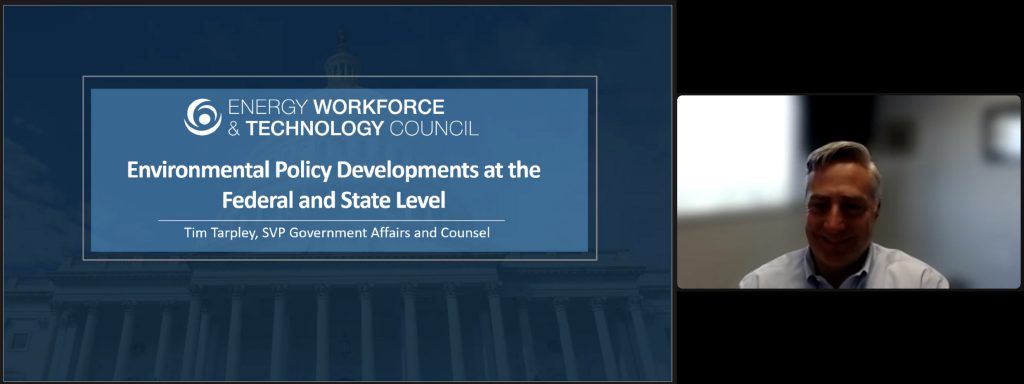Energy Workforce SVP Government Affairs Tim Tarpley discussed environmental policy developments at the federal and state level for the IPEConnect series at the University of Tulsa on May 20.
Diving into policy issues that are at the forefront of energy policy today, Tarpley shared his thoughts on the federal lands leasing moratorium, the SEC guidelines for ESG reporting and the bipartisan energy working group in Washington.
Tarpley opened up his presentation with a brief overview of the federal lands leasing moratorium set in place by the Biden Administration. Since its inception, the moratorium has been challenged at the federal court level several times and continues to be under much scrutiny by energy advocates across the country.
Tarpley echoed statements that he made in his testimony before the Committee on Natural Resources in early March.
“The Administration needs to end the moratorium on new leases for onshore and offshore drilling on federal lands. The Department of Interior should immediately appeal the federal judge’s decision overturning the recent offshore lease sale 257, and they should adhere to the Minerals Leasing Act and hold quarterly lease sales as required by law.”
Tim Tarpley, SVP Government Affairs, Energy Workforce & Technology Council
Tarpley then discussed the pending release of proposed rules from the SEC governing ESG disclosure. The proposed rules will require companies to disclose their Scope 1 emissions, along with their Scope 2 emissions in their typical financial reporting package.
“If adopted, these rules would force publicly traded companies to reveal the ways climate change could threaten their businesses and to estimate what their carbon contributions are throughout their companies’ operations, and in some cases, down the chain into Scope 3 emissions.”
Tim Tarpley
If Scope 3 emissions reporting becomes required as a part of the proposed rules, registrants will be required to disclose information on upstream and downstream activities included in its values chain.
Tarpley discussed whether the proposed rules would go beyond the SEC’s jurisdictional authority, and questioned if the “one-size fits all” approach by the SEC would be a feasible solution for everyone. Tarpley told participants there will likely be an effort in the U.S. Senate to employ the Congressional Review Act process towards the rule once it is finalized and released by the SEC. The CRA allows for Congress to vote to block implementation of regulations finalized by federal agencies and submitted to Congress within the past 60 days. However, the President does have veto power over CRA legislation passed by Congress, and it would require a two-thirds majority in both chambers to override a veto.
Finally, Tarpley gave an update on the Bipartisan Energy Working Group that is meeting in Washington, DC. Many pundits see this working group as a last-ditch effort to save provisions from the “Build Back Better” legislation that failed at the end of last year, before the current Congress goes into recess. Tarpley focused on two major policy items the bipartisan group is working on:
- Expansion of 45Q Tax Credit – 45Q is the tax-based incentivization mechanism that is in place to encourage increased development of domestic CCUS projects and expand the scope of CCUS projects to be more inclusive of other carbon-producing projects. Sen. Joe Manchin and colleagues are supportive of increasing the number of qualified projects available to receive 45Q tax credits, as well as increasing the value of each metric ton of CO2 that is sequestered from ~$50/ton to ~$85/ton.
- Methane Fee – This proposition would require companies to pay a set price on their methane emissions in addition to the existing methane rule.
While the bipartisan group has been working diligently behind closed doors to get a deal done, it is unlikely the package will go through before the current Congress recesses for the summer.
If your company is interested in this issue and working with the Council’s Government Affairs Committee, contact SVP Government Affairs & Counsel Tim Tarpley.
Phil DeBauche, Director, Environmental and Technical, writes about the Council’s environmental and HSE efforts. Click here to subscribe to the Energy Workforce newsletter, which highlights sector-specific issues, best practices, activities and more.





